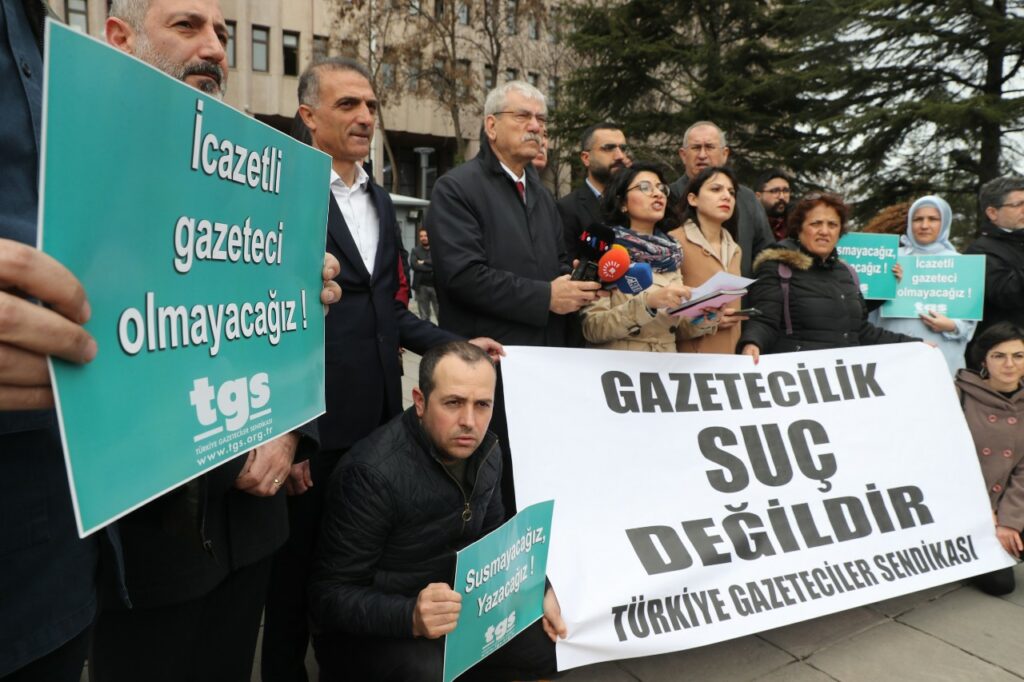Turkey arrested four members of the press in addition to detaining 24 others in the first three months of 2021, with COVID-19 adding to the growing pressure on journalists in the country, a report recently released by the Turkish Journalists’ Association (TGC) has revealed.
The Media Monitoring Report on Turkey for January-February-March 2021 was prepared within the scope of the Media for Democracy/Democracy for Media Project, which was established by the association and funded by the European Union. It aims to strengthen pluralist media and a free press as a safeguard for democracy in the country.
“Turkey remains to be the world’s top jailer of journalists. The number of journalists behind bars varies from report to report since not every press member is considered as a ‘journalist’ by the associations and organizations that draft media monitoring reports,” the TGC noted.
As of the end of March 2021, there were 70 journalists in Turkey’s prisons – 34 arrested and 36 convicted – the report said, adding that the figure was recently reported to be 96 by Jailed Journos, an online platform, 67 by the International Federation of Journalists (IFJ) and 64 by the International Press Institute (IPI).
Müyesser Yıldız, Hakan Aygün and İdris Sayılgan were among the 20 journalists that were handed down sentences varying between 10 months and 10 years in the first quarter of the year as a total of 220 press members appeared before a court on charges that included “terrorism,” “insulting the president” and “inciting hatred and enmity among the public,” the TGC further stated.
According to the report, at least 54 journalists were among Turkey’s political prisoners who were kept behind bars despite a law adopted by the Justice and Development Party (AKP) government in April 2020 to release thousands of inmates to ease overcrowding in jails and protect detainees from the coronavirus.
Turkey’s political prisoners include tens of thousands who have been imprisoned on terror-related charges as part of a crackdown launched by Turkish President Recep Tayyip Erdoğan in the aftermath of an attempted coup in 2016, although they didn’t engage in any criminal activity but were only critical of the government.
Forty press members were subjected to physical violence in Turkey in the first three months of 2021, with some of the attacks taking place after the journalists had been pointed to as targets by senior politicians, the report also revealed.
“In Turkey, incidents of attacks on the press members on the street have become common as the perpetrators had been encouraged by impunity in many of such cases,” the TGC emphasized, adding that Afşin Hatipoğlu, Orhan Uğuroğlu and Levent Gültekin were among those who were assaulted in the first quarter of 2021, while radio host Hasım Özsu died following one such incident in western Bursa province.
Access to 10 news websites, including those of the Etkin news agency (ETHA) and the Mezopotamya news agency (MA), was blocked in the first three months of 2021, according to the report.
Based on data received from answers to parliamentary questions by several main opposition party MPs, the TGC indicated that the number of journalists with press cards in Turkey decreased by 57 between Dec. 30, 2020 and Jan. 21, 2021, from 15,148 to 15,091.
“As of March 31, 2021, a total of 220 press members have yet to receive their press cards, which are said to be ‘under evaluation’ [by Turkey’s Presidential Communications Directorate] since a regulation on press cards was adopted in the country in December 2018,” they added.
In the conclusion of the report, the TGC underlined that there were hardly any reasons to be hopeful about the conditions facing journalists in Turkey in 2021, which started “under a dark cloud of the pandemic.”
It’s not hard to imagine that attacks on journalists, detentions, police violence, prosecutions, manipulations and incidents of journalists being pointed to as targets will continue, the TGC stated, adding that freedom of expression advocates, journalists and press organizations, therefore, must be even stronger in their demand for democracy in Turkey.
Turkey, which has dropped precipitously since it was ranked 100th among 139 countries when the Reporters Without Borders (RSF) published its first worldwide index in 2002, when the AKP government came to power, was ranked 153rd out of 180 countries in the 2021 World Press Freedom Index.

